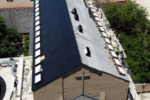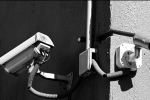July 2013
Vision & Planning
[Accepting] God’s Gift of Chaos
For the last four years – and perhaps for quite some time to come – my diocese [Fort Worth] has lived in the midst of chaotic change. After the schismatic departure of a bishop, along with a number of clergy and congregations, we embarked on the journey of re-organizing. Four years ago, the diocesan office had only two desks, two chairs, and two computers with Microsoft Office – no lists, no directories, no files, and few of the traditional organizations and processes in place. The great gift of this challenge has been the opportunity to re-think and re-vision the role of a diocesan office. With restricted resources and personnel, we focus on supporting the work of our congregations. We’ll be years learning the lessons that this transition has to offer.
Not every situation is as extreme as the one my diocese is currently facing. But in spite of most congregations’ desire to do all things “decent and in order,” congregational leaders are often faced with what seems like chaos. Accepting and working within the inherent messiness of our church systems is one way of recognizing our call to be co-creators with God. After all, the God we worship chose to use chaos as the raw material for the entire universe.
Usually, in spite of God’s call, the leap from stuckness into chaos isn’t what we’d choose to do. A number of years ago, the news that my large downtown congregation would be forced to gut and remodel our 65,000-square-foot, four-story “parish house” was hardly welcome. The church had occupied, used, and crammed keepsakes into that space for more than 70 years. Except for traditional worship, practically every function of the congregation used that building – offices, kitchen, social functions, classrooms, nursery, library, youth room, alternative worship, vesting areas, choir rehearsal and music storage, archives, you name it.
With care and wisdom, our rector grounded us firmly in our history as we planned and envisioned a future together, sharing the dream of a re-created building at the heart of our parish life. The original builders had laid the cornerstone of the parish house not long before the start of the Great Depression. Yet they had persevered through financial hardship, creating the building that we were now working to renovate. So we understood ourselves as standing on the shoulders of giants, and we were inspired by their example.
Fortunately, we found relatively nearby space to rent – but only 15,000 square feet total. And not all in one location! Months were spent planning for vacating the building, re-establishing our congregation’s work in temporary quarters, and funding the renovation. And despite our hard work and forward thinking, we ran into lots of unexpected bumps along the way. More than two years later, we celebrated the opening of a beautiful re-incarnation of the old building.
Often, we feared the chaos would overwhelm us. But looking back on the experience, I see it as a time of challenge, growth, and creativity that brought out new strengths in our congregation. We learned lessons that equipped us for future adventures in following the leading of the Spirit:
We only needed to focus on a few steps at a time. Trying to envision the entire process and every single detail all at the same time gave us vertigo. There was too much complexity – and a wealth of willing, smart leaders and able workers who were committed to making the many parts of the process work together. Collaboration, communication, and coordination were much more important than total command and control.
We had been hanging on to way too much stuff. It was simply astounding how many unused or under-utilized “treasures”could be repurposed, given away, sold, or thrown in the trash. Sure, we stored some things during the reconstruction. But not nearly as much as we passed along.
We could invent more than one way to do things well. Our alternative service moved to a new location and discovered that the new space called for new solutions. The congregation engaged their imaginations and learned a grace-filled flexibility, enriching the worship experience both in their temporary space and when they returned to their newly refurbished quarters.
We were able to rise to the challenge. Our temporary nursery and children’s classrooms were located across a downtown park from our church building. To help people find the way, we created an “umbrella brigade” who carried distinctive golf umbrellas rain or shine so they could be spotted easily. These guides helped families find the way. And in the process, they became friendly features of the downtown scene, offering directions to tourists. And always welcoming the people they encountered to join us – for class, for church, and for fellowship.
We were unaware of all the gifts we had among us. Those children’s classrooms were in the basement of an office building – a really daunting environment. This changed when a gifted artist stepped forward to transform the sterile windowless walls with landscapes and forests and castles that welcomed children and their parents.
We were enriched by connecting with our neighbors. Since we couldn’t accommodate all our activities on our one downtown block, we had to interact on a daily basis with all sorts of people in the neighborhood – street people and office workers, vendors and landlords, and tourists.
We grew in generosity and hospitality. Like a big family in a small house, we had to learn how to share our limited spaces. We expanded our ideas about welcoming, especially as we developed our neighborhood connections.
Not everyone in the church was comfortable with the need to make changes. We lost some in terms of attendance, though not as many as we had feared. Some of our traditional events had to go on hiatus; many of them were re-established with renewed energy. We struggled to deal with competing needs and visions. And it wasn’t easy. There was lots of hard work, especially in learning to be far-sighted and encouraging to one another.
Like many of the challenges life brings our way, chaos is often a gift. It calls the question, forcing us to make intentional decisions about what to keep and what to discard. It tests our commitments and our faith that, “bidden or unbidden, God is present.” It compels us to connect with community, with fellow pilgrims on the way. And it invites us into new creation, working in partnership with the Creator of all.
Demi Prentiss is ministry developer for the Episcopal Diocese of Fort Worth. For 25 years she has worked in national, diocesan, and congregational settings equipping and supporting God’s people as they become intentional partners in God’s dream for the world. She lives with her husband and two dogs in Denton, Texas.
Resources
- Diana Butler Bass, Christianity After Religion, (Harper Collins, 2013) and a conversation with the author about this book
- Eugene H. Peterson, Christ Plays in Ten Thousand Places: A Conversation in Spiritual Theology (Wm. B. Eerdmans Publishing Co., 2005)
- Congregational Seasons: a Resource for Transitions (a great source for stories of congregations negotiating change)
- “Experimenting” by Jeremiah Sierra (ECF Vital Practices Vital Post)
- Phyllis Tickle, The Great Emergence (BakerBooks, 2008)
- Interview with Phyllis Tickle on The Great Emergence
- Otto Scharmer, Theory U: Leading from the Future as it Emerges
- “The Essence of Theory U and Presencing” a YouTube video featuring Otto Scharmer
- From Bp. Steven Charleston – June 13, 2013 - “Diversity, change and imagination. These were three words that came to mind as I meditated on the nature of the God I have observed over all these many years. God's creation sings of diversity. That creation is constantly changing. To have made it so took boundless imagination. How ironic then that these three qualities are often the ones religions have the most difficulty embracing. We can fear diversity. We impede change. We struggle to allow people to think. Let us be more like the One we worship: welcoming, evolving, ever open to a new idea.”






